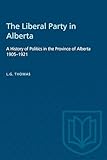The Liberal Party in Alberta : A History of Politics in the Province of Alberta 1905-1921 / L.G. Thomas.
Material type: TextSeries: HeritagePublisher: Toronto : University of Toronto Press, [1959]Copyright date: ©1959Description: 1 online resource (244 p.)Content type:
TextSeries: HeritagePublisher: Toronto : University of Toronto Press, [1959]Copyright date: ©1959Description: 1 online resource (244 p.)Content type: - 9781487585051
- 9781487575007
- 324.27106 23
- JL197.L5 .T466 2018
- online - DeGruyter
| Item type | Current library | Call number | URL | Status | Notes | Barcode | |
|---|---|---|---|---|---|---|---|
 eBook
eBook
|
Biblioteca "Angelicum" Pont. Univ. S.Tommaso d'Aquino Nuvola online | online - DeGruyter (Browse shelf(Opens below)) | Online access | Not for loan (Accesso limitato) | Accesso per gli utenti autorizzati / Access for authorized users | (dgr)9781487575007 |
restricted access online access with authorization star
http://purl.org/coar/access_right/c_16ec
Since Alberta became a province in 1905, three parties have held office. Each won a sweeping initial victory, followed by a long tenure of office during which the opposition was ineffective. Both of the first two parties then experienced virtual annihilation at the hands of a new grassroots movement. Despite the non-party tradition which had early become established in the North-West Territories under F.W.G. Haultain, the Liberal party triumphed in the election that followed the founding of the province, and subsequently held office for sixteen years. Why was the victory so sweeping, and why did the Liberal machine eventually break down? Why was the Conservative party unable to establish an effective opposition, and why did the United Farmers of Alberta succeed in dislodging the Liberals when the Conservatives party unable to establish an effective opposition, and why did the United Farmers of Alberta succeed in dislodging the Liberals when the Conservatives had failed? Was there, in fact, a non-party tradition of government that remained alive throughout the whole period of Liberal rule? Do the traditional parties, indeed, seem to the people of the West to have any particular relevance to provincial or territorial affairs, despite apparent willingness to accept them in the federal sphere? Professor Thomas examines these questions thoroughly in tracing the background of politics in Alberta leading up to the rise to power of the Social Credit movement in 1935. His study, based on extensive research in newspaper files and other documents, is a major contribution to Canadian historiography and political science. This book is No. 8 in the Series, Social Credit in Alberta; Its Background and Development.
Mode of access: Internet via World Wide Web.
In English.
Description based on online resource; title from PDF title page (publisher's Web site, viewed 01. Nov 2023)


